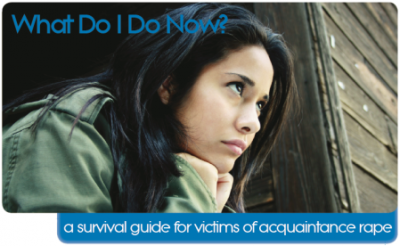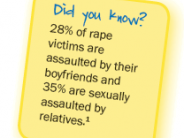- Meet the Team
- Communications
-
What We Do
-
- Community Oriented Policing Ride Along Program Chaplain Program Services Summary
- Safety Prevention Auto & Traffic Safety Sex Offenders Neighborhood Block Watch Child Safety Domestic Violence Sexual Assault Awareness Warrant List
- Safety Prevention Gang Awareness Gang Task Force Senior Safety Police Patrols Investigations
-
-
Get Involved
-
- Ride Along Program Chaplain Program Services Summary
- Contact the City Submit a Request or Concern Staff Directory Documents and Forms Documents and Reports Forms and Applications
- Social Media Facebook In the News
-
Sexual Assault Awareness
What is acquaintance rape?
Acquaintance rape is when somebody a teen knows—a boyfriend or girlfriend, a friend, a classmate, or even someone they just met—uses coercion (including drugs or alcohol), violence, or threats to force unwanted oral, vaginal, or anal sex. When this happens in a dating relationship, it is commonly known as "date rape."
As many as one in four young women reported being verbally or physically pressured into having sex during the past year.
How common is acquaintance rape?
Unfortunately, acquaintance rape is very common. In some surveys, as many as one in four young women reported being verbally or physically pressured into having sex during the past year, while one in 10 high school girls—and one in 20 boys—reported being forced into sex at some point in their lives.
More than one-third of acquaintance rape victims are between the ages of 14 and 17.
How can I help protect my teen from acquaintance rape?
Although the blame for rape always lies with the rapist, there are some factors that can increase a teen’s risk of acquaintance rape. This include:
- Frequently drinking to the point of being drunk or unable to resist sexual advances
- Using recreational drugs that impair judgment or make it difficult to resist sexual advances
- Outdated beliefs about sexual roles, such as thinking that someone who pays for a date has the right to expect sex
- Prior history of rape or sexual victimization
Caring Parents can help teens stay safe by giving them the information and support they need to make smart choices and avoid risky situations.
Parents can give their teens reliable information about sexual intercourse (including ways to protect themselves from sexually transmitted disease and pregnancy), alcohol, drugs (including "date rape" drugs such as Rohypnol and GHB), and the qualities of healthy relationships.
Talking about these topics can be hard, but the more open and honest you are with your teen, the more likely it will be that he or she will turn to you with any questions and concerns. In fact, in a recent survey of American high school students, 9 out of 10 teens said it would be easier to delay sexual activity if they were able to have "more open, honest conversations" with their parents about sexual issues.
Click any thumbnail image to view a slideshow


